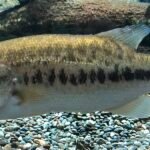Australia.- A new IMAS Study has revealed some of the ways that Atlantic salmon physiology may be affected by rising ocean temperatures, an increasing challenge for the aquaculture industry as the climate changes.
Atlantic salmon in Tasmania are farmed in water temperatures near to the upper limit of their thermal tolerance, with average temperatures above 19 degrees Celsius in summer having an impact on the fish’s growth performance.
Led by IMAS PhD student Waldo Nuez-Ortin, the study published in the journal BMC Genomics examined how a salmon’s liver function changed as its metabolic rate rose in response to water temperatures of 21 degrees Celsius.
Dr Nuez-Ortin said understanding how Atlantic salmon will be affected by climate change is of growing importance in temperate production areas such as Tasmania, Chile and Norway where waters are increasing in temperature.
“This study increases our understanding of what happens to Atlantic salmon at a molecular level as they cope with elevated temperatures,” Dr Nuez said.
“To achieve this we used proteomics as an unbiased and comprehensive technique to discover changes in liver function at the protein level.
“Sea-caged Atlantic salmon cannot escape warmer surface waters by diving deeply, and so risk long-term exposure to physiological challenges that increase demands for energy and impair production efficiency.”
Co-author IMAS Professor Chris Carter said any temperature rise increases the fish’s metabolic rate and therefore the amount of energy they use.
Stay Always Informed
Join our communities to instantly receive the most important news, reports, and analysis from the aquaculture industry.
“By studying changes in the salmon liver proteome after exposure to prolonged elevated temperatures, we were able to identify that the main way the salmon met the need for extra energy was to suppress liver functions that synthesise and degrade proteins,” Professor Carter said.
“This research is part of an ongoing program that aims to understand how salmon and other aquaculture animals manage increased temperature and to build a picture about a sequence of physiological changes that occur over periods of exposure to elevated temperature.”
Professor Carter said the research would also contribute to selective breeding and aquaculture management, and would support the ongoing development of salmon feed which specifically address the needs of salmon during summer.
The research was carried out at two of the University’s advanced facilities: the Central Science Laboratory and the Experimental Aquaculture Facility (EAF), the only one of its type in the Southern hemisphere, where salmon can be studied under differing environmental and rearing conditions.
The EAF was established at IMAS Taroona in 2015 in collaboration with Huon Aquaculture and Skretting to carry out commercially relevant research that supports the economic and environmental sustainability of the aquaculture industry.
Reference (open):
Waldo G. Nuez-Ortín, Chris G. Carter, Peter D. Nichols, Ira R. Cooke and Richard Wilson. Liver proteome response of pre-harvest Atlantic salmon following exposure to elevated temperature. BMC Genomics, 2018 19:133. https://doi.org/10.1186/s12864-018-4517-0
https://bmcgenomics.biomedcentral.com/articles/10.1186/s12864-018-4517-0
Source: IMAS – UTAS
Editor at the digital magazine AquaHoy. He holds a degree in Aquaculture Biology from the National University of Santa (UNS) and a Master’s degree in Science and Innovation Management from the Polytechnic University of Valencia, with postgraduate diplomas in Business Innovation and Innovation Management. He possesses extensive experience in the aquaculture and fisheries sector, having led the Fisheries Innovation Unit of the National Program for Innovation in Fisheries and Aquaculture (PNIPA). He has served as a senior consultant in technology watch, an innovation project formulator and advisor, and a lecturer at UNS. He is a member of the Peruvian College of Biologists and was recognized by the World Aquaculture Society (WAS) in 2016 for his contribution to aquaculture.







